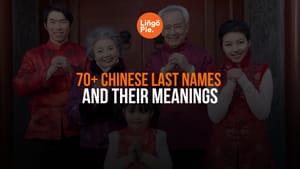Did you know that only about 5% of Chinese people speak English? That means knowing essential Chinese phrases is important when traveling to China, Taiwan, or even parts of Singapore.
When I first traveled to China, I quickly realized how much of a difference knowing just the basic Chinese phrases could make. From ordering food to asking for directions, these simple phrases saved me countless times and helped me make genuine connections.
In this article, you’ll learn essential Chinese phrases for different situations that you can encounter as a traveler in China, from greetings and shopping to ordering food and having casual conversations so that you can get the most out of your China travel!
- Qixi Festival (Chinese Valentine's Day)
- Dragon Boat Festival
- Chinese Intermediate Movies on Netflix
Chinese Phrases For Greetings And Courtesy

When traveling in China, knowing a few basic greetings and courtesy phrases is essential. These will help you make a positive first impression and show respect in everyday interactions. Here are some of the most common ones:
- 你好 (nǐ hǎo) – Hello
This is the most straightforward greeting in Mandarin and can be used in nearly every situation to say "hi." - 谢谢 (xiè xiè) – Thank you
A simple "thank you" goes a long way, whether you're receiving help, services, or even directions from someone. - 再见 (zài jiàn) – Goodbye
This is the standard way to say goodbye in Chinese, appropriate for both formal and casual settings. - 请 (qǐng) – Please
This is a versatile phrase used in polite requests or to invite someone to do something, like “please sit” (请坐, qǐng zuò). - 对不起 (duì bu qǐ) – Sorry
This phrase is useful for apologizing when you bump into someone, make a mistake, or need to excuse yourself. - 没关系 (méi guān xi) – It’s okay / No problem
Use this phrase to reassure someone that it’s not a big deal or to say "you’re welcome" after someone thanks you. - 好的 (hǎo de) – Okay / All right
This is a simple way to agree or acknowledge understanding, often used in daily conversations. - 请问 (qǐng wèn) – Excuse me / May I ask
Use this phrase to politely get someone's attention before asking a question, like “Excuse me, where is the bathroom?” (请问洗手间在哪里? qǐng wèn xǐ shǒu jiān zài nǎ lǐ?) - 不客气 (bù kè qì) – You’re welcome
This phrase is a polite way to respond to someone thanking you, similar to saying "don't mention it." - 早上好 (zǎo shàng hǎo) – Good morning
While 你好 (nǐ hǎo) works anytime, 早上好 is more appropriate in the morning. - 晚上好 (wǎn shàng hǎo) – Good evening
Use this in the evening or when greeting someone at night.

Chinese Phrases For Introducing Yourself
Introducing yourself effectively is crucial for making a good first impression. Here are some common phrases and sentences to help you introduce yourself in Chinese:
- 你好,我叫 ... (nǐ hǎo, wǒ jiào [Your Name]) – Hello, my name is ...
A standard way to introduce yourself by stating your name. - 我来自 ... (wǒ lái zì [Your Country/City]) – I am from ...
Useful for sharing your place of origin. - 我今年 ... 岁 (wǒ jīn nián [Your Age] suì) – I am ... years old
You can use this phrase to indicate your age if it’s relevant. - 我在 ... 工作/学习 (wǒ zài [Your Occupation/School] gōng zuò/xué xí) – I work/study at ...
Introduce your occupation or educational institution. - 我很高兴认识你 (wǒ hěn gāo xìng rèn shí nǐ) – I’m pleased to meet you
A polite phrase to express that you are happy to meet someone.
Chinese Phrases For Small Talk

When traveling or living in China, engaging in small talk can help you build relationships with locals and enrich your experience. Here are some useful phrases to help you start conversations and connect with people:
- 你来自哪里? (nǐ lái zì nǎ lǐ?) – Where are you from?
This is a common question to ask when meeting someone for the first time, showing curiosity about their background. - 你会说中文吗? (nǐ huì shuō zhōng wén ma?) – Do you speak Chinese?
A polite way to gauge someone's language abilities, which can help steer the conversation. - 你叫什么名字? (nǐ jiào shén me míng zi?) – What’s your name?
A basic but essential phrase for any conversation. - 你喜欢中国吗? (nǐ xǐ huān zhōng guó ma?) – Do you like China?
Asking someone about their feelings toward the country can create a positive exchange, especially if you're a foreigner learning about local culture. - 你的工作是什么? (nǐ de gōng zuò shì shén me?) – What is your job?
This question is a polite and common way to break the ice in a more formal or casual setting. - 你多大了? (nǐ duō dà le?) – How old are you?
This question is often asked, as age is an important part of social context in China, but it’s best to use this in more casual settings or with younger people. - 今天怎么样? (jīn tiān zěn me yàng?) – How’s your day?
A friendly phrase to ask about someone’s well-being and start a light conversation. - 天气很好, 对吧? (tiān qì hěn hǎo, duì ba?) – The weather is nice, isn’t it?
Just like in many cultures, weather can be a neutral and easy topic for small talk.
Chinese Phrases For Asking Directions
When you're traveling in a new country, especially one where English isn't widely spoken, knowing how to ask for directions and navigate public spaces is crucial. Here are key phrases that will help you get around easily in China:
- 请问 (qǐng wèn) – Excuse me
This phrase is perfect for politely getting someone's attention before asking a question. - 请问洗手间在哪里? (qǐng wèn xǐ shǒu jiān zài nǎ lǐ) – Where is the bathroom?
A must-know question for any traveler, this will help you locate restrooms, especially in public places like train stations or shopping malls. - 这个地方在哪里? (zhè gè dì fāng zài nǎ lǐ?) – Where is this place?
Use this when showing someone the name of a location on your phone or map. - 我迷路了 (wǒ mí lù le) – I’m lost
If you're disoriented, this phrase can help you communicate that you need assistance finding your way. - 我要去... (wǒ yào qù...) – I want to go to...
Perfect for telling taxi drivers or locals where you want to go. Simply add the name of the destination after 去 (qù). - 这里 (zhè lǐ) – Here
Use this word to refer to your current location or indicate a place on a map. - 离这里多远? (lí zhè lǐ duō yuǎn?) – How far is it from here?
Use this to gauge the distance to your destination, which can be particularly useful when deciding whether to walk or take a cab. - 左转 (zuǒ zhuǎn) – Turn left
- 右转 (yòu zhuǎn) – Turn right
- 直走 (zhí zǒu) – Go straight

Chinese Phrases For Transportation
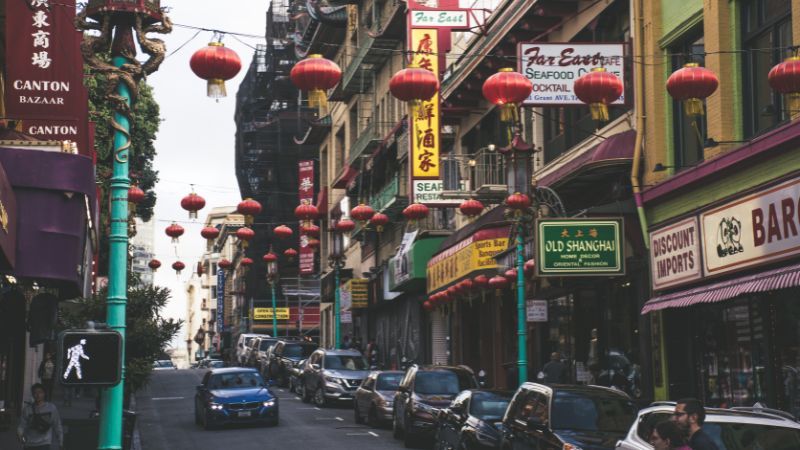
Navigating transportation in China can be challenging if you’re not familiar with the local language. Here are some essential phrases to help you get around:
- 公交车 (gōng jiāo chē) – Bus
- 地铁 (dì tiě) – Subway
- 出租车 (chū zū chē) – Taxi
- 火车 (huǒ chē) – Train
- 轮船 (lún chuán) – Ship
- 小巴 (xiǎo bā) – Minibus
- 高铁 (gāo tiě) – High-speed train
- 请问,最近的地铁站在哪里? (qǐng wèn, zuì jìn de dì tiě zhàn zài nǎ lǐ?) – Excuse me, where is the nearest subway station?
Use this phrase to ask for directions to the closest subway station. It’s helpful when you need to catch public transportation. - 我想去 ... (wǒ xiǎng qù ...) – I want to go to ...
This phrase is essential for telling taxi drivers or asking for directions to your destination. Just replace "..." with the name of your destination. - 这辆车去 ... 吗? (zhè liàng chē qù ... ma?) – Does this bus/train go to ...?
Use this question to confirm whether the bus or train you’re about to board goes to your intended location. - 多少钱到 ...? (duō shǎo qián dào ...?) – How much to get to ...?
Useful for inquiring about the fare or cost of a taxi ride to your destination. - 我要买车票 (wǒ yào mǎi chē piào) – I want to buy a ticket.
Use this phrase when purchasing tickets for trains, buses, or other modes of transportation. - 我可以刷卡吗? (wǒ kě yǐ shuā kǎ ma?) – Can I pay by card?
This question helps determine if you can use a credit or debit card for payment instead of cash. - 请问,下一班车是什么时候? (qǐng wèn, xià yī bān chē shì shén me shí hòu?) – Excuse me, when is the next train/bus?
Use this to ask about the schedule of the next available train or bus. - 我迷路了 (wǒ mí lù le) – I’m lost.
If you find yourself disoriented and need help finding your way, this phrase will alert others to assist you. - 请带我去这个地址 (qǐng dài wǒ qù zhè ge dì zhǐ) – Please take me to this address.
Handy for taxi drivers or ride-sharing services when you have an address to go to. - 有没有直达的 ...? (yǒu méi yǒu zhí dá de ...?) – Is there a direct ...?
Replace "..." with the type of transportation (bus, train, etc.) to ask if there is a direct route to your destination.
Chinese Phrases For Ordering Food and Drinks
When eating out in China, knowing a few key phrases can make your dining experience much smoother and more enjoyable. Here are some essential phrases to help you order food and drinks confidently:
- 我要 (wǒ yào) – I want
Use this phrase to indicate what you'd like to order, whether it's a dish or a drink. For example, "我要一杯茶" (wǒ yào yī bēi chá) means "I want a cup of tea." - 这个 (zhè ge) – This
Perfect for pointing at a dish on the menu or a picture if you’re unsure how to pronounce the name. Simply say 这个 while pointing to what you want. - 菜单 (cài dān) – Menu
When you sit down at a restaurant or café, you can politely ask for the menu by saying 请给我菜单 (qǐng gěi wǒ cài dān) – Please give me the menu. - 多少钱? (duō shǎo qián?) – How much is this?
Useful for checking the price of a dish, especially in markets or smaller eateries where prices might not be clearly listed. - 有...吗? (yǒu ... ma?) – Do you have...?
Use this phrase to ask if the restaurant has a particular dish or drink. For example, 有啤酒吗? (yǒu pí jiǔ ma?) – Do you have beer? - 不要辣 (bù yào là) – No spicy
If you’re not a fan of spicy food, this is an important phrase in Chinese cuisine. You can ask for your food without spice by using this expression. - 埋单 (mái dān) – The bill, please
When you’re ready to pay, this is the phrase you’ll use to ask for the bill.
Chinese Phrases For Shopping
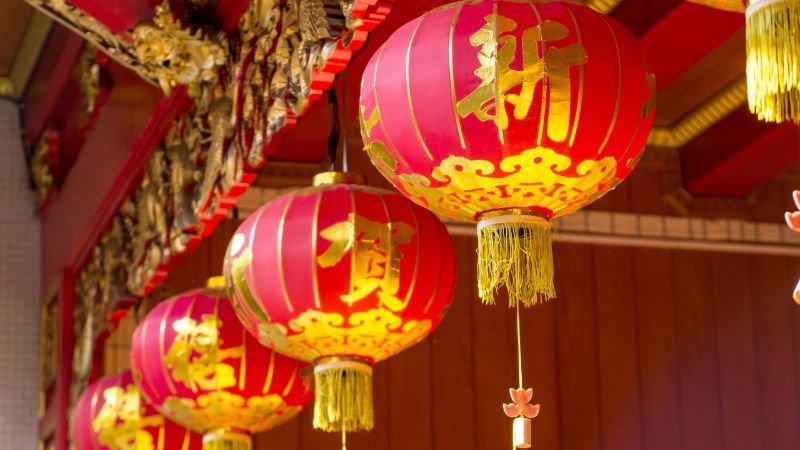
When shopping in China, especially in markets and small shops, bargaining is often expected. Being able to communicate effectively while shopping can save you money and help you enjoy the experience more. Here are some key phrases to use while shopping and haggling:
- 多少钱? (duō shǎo qián?) – How much?
This is the most common way to ask for the price of an item. - 可以便宜一点吗? (kě yǐ pián yí yī diǎn ma?) – Can it be cheaper?
A polite way to ask for a discount, which is essential for bargaining in markets. - 太贵了! (tài guì le!) – Too expensive!
Use this to express that the price is too high, often a lead-in to negotiating a lower price. - 我再看看 (wǒ zài kàn kàn) – I’ll look around
A phrase you can use to disengage if you're not satisfied with the price politely. This often prompts the seller to lower the price to keep you from walking away. - 我不要 (wǒ bù yào) – I don’t want it
If the price doesn’t meet your expectations, this firm statement can help during negotiations, as walking away sometimes results in the seller lowering their price. - 你可以给我打折吗? (nǐ kě yǐ gěi wǒ dǎ zhé ma?) – Can you give me a discount?
A direct way to ask for a price reduction, especially in stores where discounts are possible.
Chinese Phrases For Expressing Needs and Emotions
Being able to clearly express your needs or emotions is crucial, especially when you need assistance or are feeling unwell. Here are some key phrases to help you communicate effectively in such situations:
- 我不舒服 (wǒ bù shū fú) – I don’t feel well
Use this phrase to indicate that you are not feeling well. It can be helpful in medical settings or when asking for assistance. - 帮助 (bāng zhù) – Help
A simple and direct way to ask for help. You can say this when you need immediate assistance. - 我迷路了 (wǒ mí lù le) – I’m lost
Use this phrase if you find yourself disoriented and need directions or guidance. - 我需要医生 (wǒ xū yào yī shēng) – I need a doctor
Essential for medical emergencies, this phrase helps you seek medical assistance quickly. - 我丢了我的钱包 (wǒ diū le wǒ de qián bāo) – I lost my wallet
Useful in situations where you need to report a lost item or seek help finding it. - 请帮我打电话 (qǐng bāng wǒ dǎ diàn huà) – Please help me make a phone call
Use this when you need assistance with making a phone call, especially if you’re not familiar with the phone system or language. - 这附近有药店吗? (zhè fù jìn yǒu yào diàn ma?) – Is there a pharmacy nearby?
Helpful for finding a place to buy medicine or other health-related items. - 我需要休息 (wǒ xū yào xiū xí) – I need to rest
Useful to indicate that you need a break or time to rest, particularly if you're feeling tired or unwell. - 我不知道怎么做 (wǒ bù zhī dào zěn me zuò) – I don’t know how to do this
Use this phrase if you need guidance or instructions on how to complete a task.
Chinese Phrases For Numbers and Counting
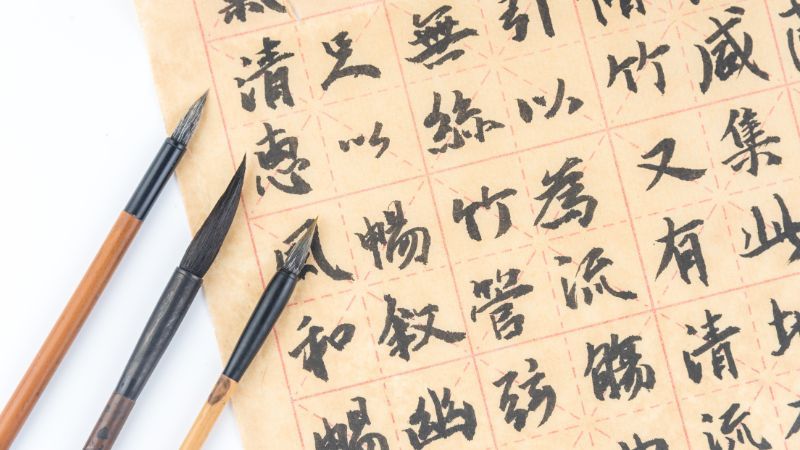
Numbers are crucial for various everyday situations, from shopping to scheduling. Mastering basic numbers and related phrases will help you navigate these situations with ease. Here are some essential phrases for handling numbers, prices, dates, and counting:
- 一 (yī) – One
- 二 (èr) – Two
- 三 (sān) – Three
- 四 (sì) – Four
- 五 (wǔ) – Five
- 六 (liù) – Six
- 七 (qī) – Seven
- 八 (bā) – Eight
- 九 (jiǔ) – Nine
- 十 (shí) – Ten
- 百 (bǎi) – Hundred
- 千 (qiān) – Thousand
- 几 (jǐ) – How many?
Use this when you want to ask about the quantity of something. - 多少 (duō shǎo) – How much? / How many?
A versatile phrase for asking about prices or quantities. - 现在几点钟? (xiàn zài jǐ diǎn zhōng?) – What time is it now?
A key phrase for inquiring about the current time. - 今天是几号? (jīn tiān shì jǐ hào?) – What’s the date today?
Useful for asking about the current date. - 这个多少钱? (zhè ge duō shǎo qián?) – How much is this?
Essential for shopping and understanding prices. - 我想买两个 (wǒ xiǎng mǎi liǎng gè) – I want to buy two
Use this phrase to specify the quantity of items you want to purchase. - 三十分钟 (sān shí fēn zhōng) – Thirty minutes
Helpful for understanding and discussing time durations.
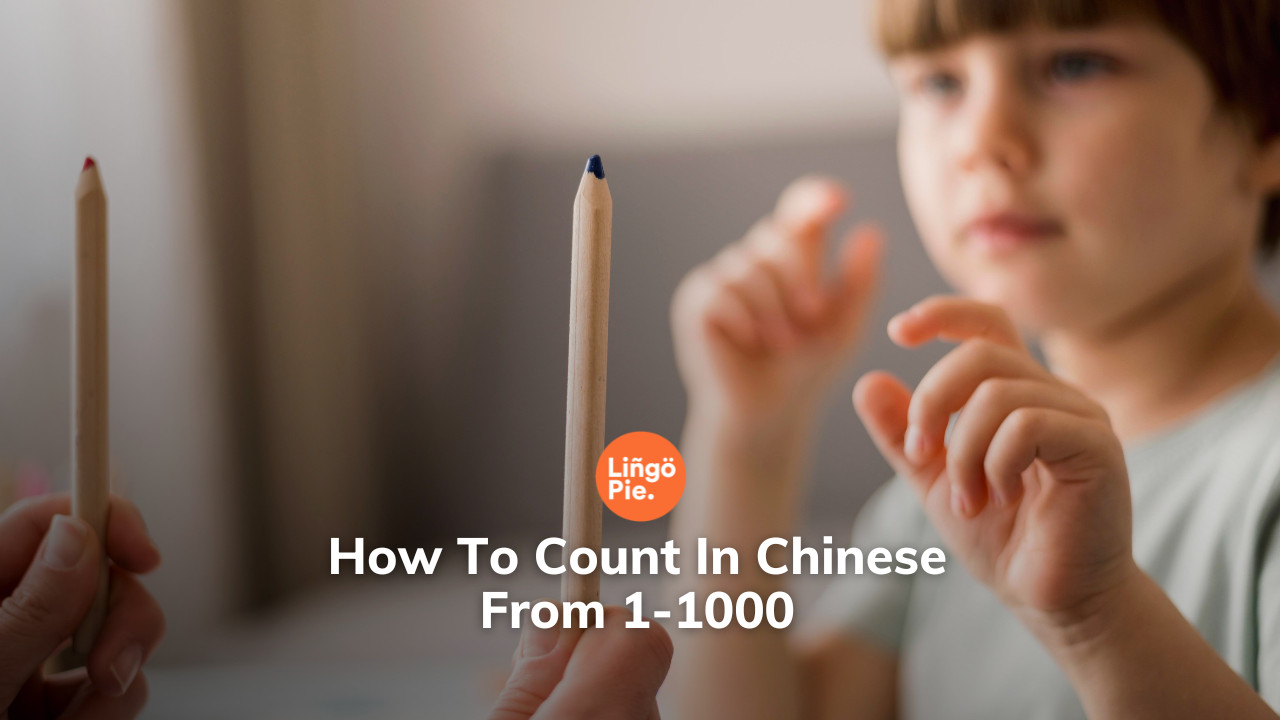
Chinese Phrases For Special Occasions
- 生日快乐 (shēng rì kuài lè) – Happy Birthday
A common phrase to wish someone well on their birthday. - 节日快乐 (jié rì kuài lè) – Happy Holidays
Used for general holiday greetings. - 新年快乐 (xīn nián kuài lè) – Happy New Year
A traditional greeting for the Chinese New Year. - 新婚快乐 (xīn hūn kuài lè) – Happy Wedding
Used to congratulate the newlyweds. - 毕业快乐 (bì yè kuài lè) – Happy Graduation
Used to celebrate someone’s graduation. - 纪念日快乐 (jì niàn rì kuài lè) – Happy Anniversary
Used to celebrate anniversaries of all kinds. - 祝贺你 (zhù hè nǐ) – Congratulations
A general phrase to congratulate someone on their achievements. - 真棒 (zhēn bàng) – Really awesome
Used to express admiration for someone’s achievements or accomplishments. - 了不起 (liǎo bù qǐ) – Remarkable
A phrase to praise someone’s impressive achievements.
Chinese Slang Phrases
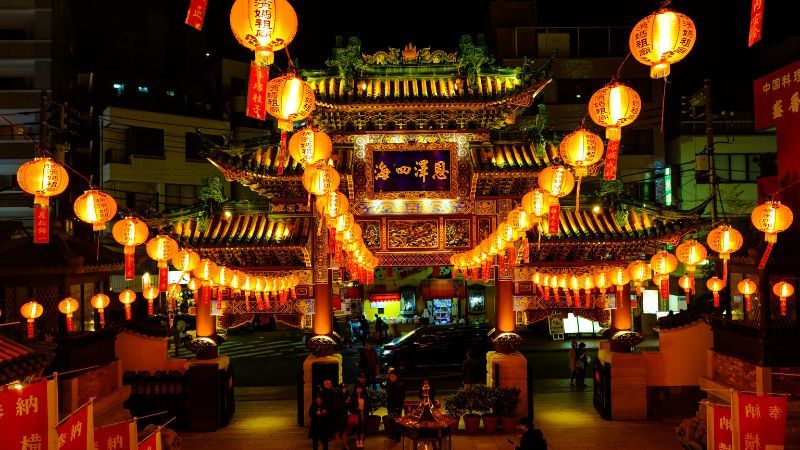
To connect with locals and sound like you’re familiar with modern Chinese, using slang and popular expressions can be very effective. Here are some casual phrases and expressions that are commonly used in everyday conversations:
- 牛 (niú) – Awesome
This term, derived from "cow" (which historically represents strength and greatness), is used to describe something impressive or cool. - 加油! (jiā yóu!) – Go for it!
A motivational phrase is used to encourage someone to keep going or to give their best effort. - 666 (liù liù liù) – Cool / Awesome
This slang originated from online gaming and represents something impressive. The repetition of the number six sounds like the Chinese word for "smooth" or "slick." - 没事 (méi shì) – It’s okay / No problem
Used to reassure someone that everything is fine or that there’s no issue. - 坑爹 (kēng diē) – Cheated / Deceived
Literally means "pit father," and is used to express that someone feels they have been tricked or let down. - 甩 (shuǎi) – Show off
Used to describe someone who is flaunting their skills or possessions in a boastful way. - 尴尬 (gān gà) – Embarrassed / Awkward
Used to describe a situation that is uncomfortable or awkward. - 打酱油 (dǎ jiàng yóu) – Not involved
Literally means "buying soy sauce," and is used to indicate that someone is not involved in or concerned with a situation. - 吃瓜 (chī guā) – To watch the drama
Literally means "eating melon," and refers to watching or following gossip or drama unfold. - 老铁 (lǎo tiě) – Good friend
A term used to refer to a close friend or buddy.
Chinese Phrases For Saying "I Don't Understand"
When communicating in Chinese, there may be times when you need to express that you don't understand something. Here are some key phrases to help you navigate those situations:
- 我不懂 (wǒ bù dǒng) – I don’t understand.
Use this phrase to indicate that you don't comprehend what’s being said or presented. It's a straightforward way to communicate a lack of understanding. - 对不起,我不明白 (duì bù qǐ, wǒ bù míng bái) – Sorry, I don’t understand.
Adding "对不起" (sorry) makes this phrase more polite. It’s appropriate when you want to apologize for not understanding something and ask for clarification. - 你能说慢一点吗? (nǐ néng shuō màn yī diǎn ma?) – Can you speak more slowly?
If you’re having difficulty keeping up with the speed of speech, this phrase politely requests the speaker to slow down so you can better understand. - 请再说一遍 (qǐng zài shuō yī biàn) – Please say it again.
Use this when you need someone to repeat what they’ve said. It’s a polite way to ask for repetition in order to catch the details you missed. - 我不太明白 (wǒ bù tài míng bái) – I don’t quite understand.
This phrase indicates partial understanding but highlights that you need further clarification. It’s useful when you grasp some of the information but not all of it.
Want To Learn More Than Just The Basics?
Knowing essential Chinese phrases can really make a difference during your travel. Whether you’re shopping, ordering food, or using transportation as a foreigner, these phrases help you communicate more smoothly and get by in a foreign country.

If you want to learn more than just the essential Chinese phrases, check out Lingopie to get fluent in Chinese! Lingopie is a great platform that lets you learn Chinese through TV shows and movies with interactive subtitles. It’s the easiest and funniest way to pick up new phrases and practice them in real-life contexts.
Try Lingopie for FREE now and start learning Chinese the "real" fun way!









